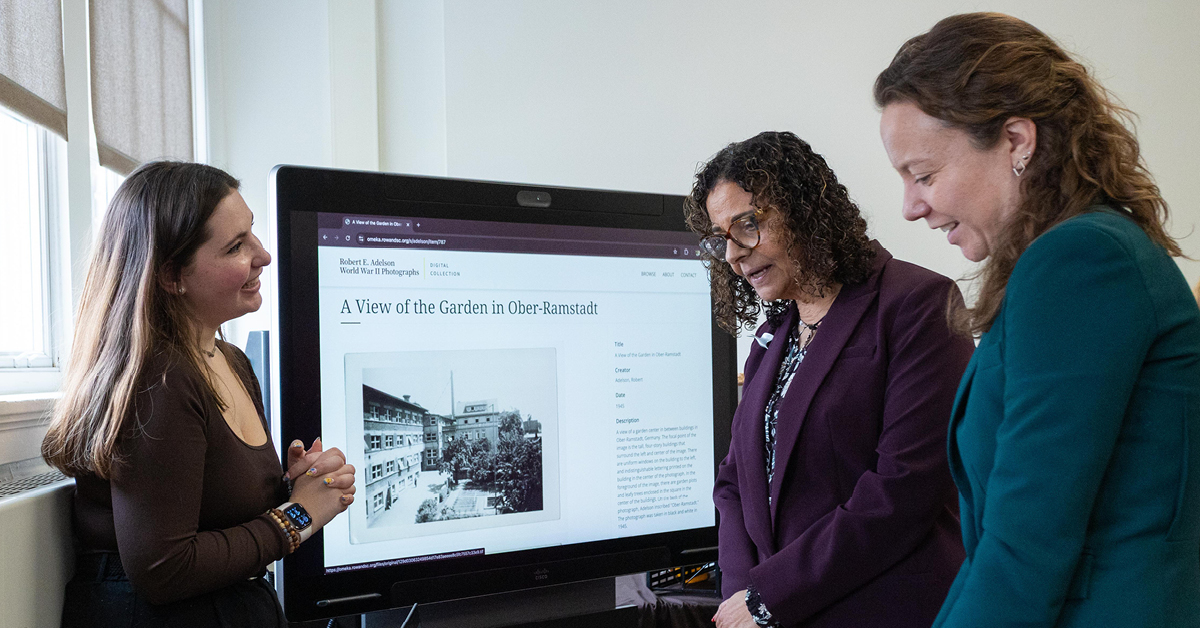Discovery and collaboration through technology: New Center for Digital Humanities Research opens
Discovery and collaboration through technology: New Center for Digital Humanities Research opens

Quiyana Goodman is chronicling New Jersey’s Juneteenth celebrations.
Denis Abaine is scouring the John F. Kennedy Library’s digital collections to gain a richer understanding of the impact of Operation Uganda, a student-led initiative supporting Ugandan independence in the 1960s.
And Emily Schmidt has contributed to projects that include: virtual interviews of female delegates to the landmark National Women’s Conference in 1977; the Levantine Ceramics Project, a scholarly collective that examines pottery dating back 7,000 years; and the Robert E. Adelson World War II Digital Photography Collection, which chronicles the experiences of a Jewish soldier in the European theatre.
Through pursuing vastly dissimilar subject matters, the Rowan University students and their classmates have one commonality: All are utilizing digital methods to conduct research and create content that is helping them—and others—gain a better understanding of our world.
That’s the goal of the new Center for Digital Humanities Research at Rowan University. Housed in the College of Humanities & Social Sciences, the center officially opened this month in a dedicated collaborative space located at 252 Bunce Hall on the Main Campus.
An interdisciplinary hub
“In the digital humanities, we use digital technology to better understand historical processes and humanities questions,” said Rowan historian Jessica Mack, who specializes in digital public history and directs the center.
“We also bring humanistic knowledge about history, literature, language or ethics to debate about new technologies, such as generative AI and machine learning. The center is an interdisciplinary hub for faculty and research at Rowan and also contributes to a larger digital humanities community.”
According to Mack, more than 85 Rowan students have enrolled in digital humanities courses or in the University’s Certificate of Graduate Study in Digital Humanities. A new Certificate of Undergraduate Study in Digital Humanities currently is in development.
Altogether thus far, 15 students have worked in the center as paid student researchers, gaining digital and professional skills as they collaborate on research projects that resonate with them.
Since 2022, more than 200 Rowan students and community members have helped transcribe letters and other online materials from the Library of Congress during the annual Douglass Day Transcribe-a-thon, according to Mack. The event gives the University community the chance to join other universities in a nationwide interactive event to transcribe documents about African American history, making them more widely accessible online.
Contributing to narratives
Through her digital humanities research, Schmidt, a senior history major and aspiring public historian, knows she has contributed to those narratives. Her oral history interviews with delegates to the National Women’s Conference will be part of “Sharing Stories from 1977,” a University of Houston digital archive project.
For The Levantine Ceramics Project, an open-access resource for the study of Levantine pottery, Schmidt contributed research, including uploading photos of artifacts, along with nearly 720 contributors around the globe. The work gives researchers deep knowledge of material culture from Neolithic times through the Ottoman period.
“That project was my favorite,” said Schmidt, who will pursue a master’s degree in history at the University of Delaware in the fall. “You could see the changes in art, the changes in patterns.
“I describe digital humanities as a field that’s dedicate to making history accessible through technology.”
To that end, Schmidt contributed to the Adelson World War II Photograph Collection at Rowan. Building on the research of students who have since graduated—Kaitlyn Ley ’22 MA ’23 and Kayla Maharaj ’23 MA ’24—Schmidt ensured the readability and accessibility of the site.
The photograph collection chronicles Adelson’s photographs through France, Germany, Switzerland, Austria, Italy and Luxembourg, offering new perspectives on the life of a Jewish American soldier. The photos—266 in all—were donated to the Rowan University Archives by Adelson’s son, Emeritus Art Professor Fred Adelson.
After scanning the photographs and completing the archival processing, students conducted research to accurately identify the locations and dates of the photographs while also creating metadata and descriptions.
“Through the collection, you see the humanity and the in-between of a soldier’s experiences,” Schmidt said.
Sharpening skills
Goodman’s work with the center researching Juneteenth helped her better understand the holiday—and will help others do the same, she said.
“This project helped me realize how important and impactful digital archives are for current and future learners,” said Goodman, a senior history major. “It’s been such a rewarding experience. Before doing this research, I didn’t know Juneteenth was being celebrated not only all over the state but for decades before it was officially a holiday.”
Abaine’s research with the JFK digital collections enriches his classroom studies tremendously, he said, adding that the center promotes invaluable collaboration between students and faculty members. Students, Mack noted, “have really been protagonists in the center’s research thus far.”
“This deep dive into the archives has sharpened my critical thinking and analytical skills, allowing me to extract meaningful insights from historical materials,” said Abaine, a first-year history major from Uganda.
“This hands-on experience has not only enhanced my technical skills but also has given me a deeper appreciation of the intersection of technology and history. I’ve learned the importance of archival research and how to effectively navigate a vast array of documents.”
Technology is “reshaping how we engage with knowledge,” CHSS Dean Nawal Ammar said.
“Digital humanities matters because it bridges traditional humanities and social sciences with emerging digital tools that expand research potential and prepare students for a rapidly evolving media landscape,” Ammar said.
“Digital tools democratize information, preserve cultural heritage and foster global collaboration. They help us uncover hidden narratives, challenge biases and create more inclusive histories.”